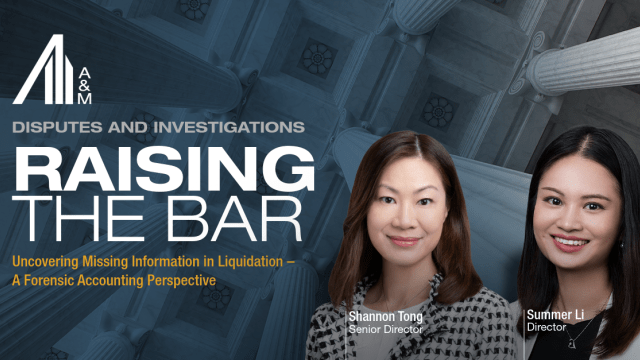Rising Fraud Risks in PE and VC Portfolios: How to Safeguard Investments
Introduction
In the previous article, Combating Increased Internal Fraud: Lessons from Recent Cases and Proactive Risk Mitigation Strategies, we examined the common themes and patterns in recent internal fraud cases across Asia-Pacific region, highlighting key lessons that help organizations mitigate such risks. Among the entities that are more vulnerable to these incidents, private equity (“PE”) and venture capital (“VC”) portfolio companies have emerged as particularly frequent targets.
Economic instability, shifting regulatory frameworks and evolving compliance requirements have amplified governance risks – ranging from financial reporting discrepancies and fraud to corruption, regulatory non-compliance, and disputes with business partners or external stakeholders.
For PE and VC firms, these heightened risks pose significant challenges in investment evaluation and portfolio management. Failure to proactively identify, mitigate, or address such issues can result in substantial financial losses, reputational harm and post-transaction legal disputes.
In this article, we take a closer look at the increasing risk landscape for PE and VC firms, while outlining actionable strategies to mitigate these exposures.
Governance Risks
PE and VC firms face a complex and evolving landscape of governance risks across the entire investment lifecycle - from initial due diligence and transaction execution to post-acquisition oversight and eventual exit. These risks, if not properly identified and mitigated, can undermine financial returns, disrupt operational efficiency, and damage the firm’s reputation among investors, regulators, and portfolio companies. Key governance risks include:
- Financial Reporting & Valuation Risks
- Earnings Manipulation: Aggressive accounting practices, such as revenue recognition fraud or hidden expenses, may distort a target’s true financial health, jeopardizing investment returns.
- Mispricing: Reliance on inaccurate, incomplete, or deliberately manipulated financial statements can lead to overvaluation, unexpected debt exposure, or post-transaction financial distress.
- Corruption & Compliance Risks
- Bribery & Kickbacks: Cross-border transactions, particularly in high-risk jurisdictions, increase exposure to violations of extra-territorial anti-bribery laws (e.g. FCPA, UK Bribery Act) and local law enforcement.
- Conflicts of Interest: Undisclosed related-party transactions or self-dealing by management can erode trust and attract regulatory scrutiny.
- Sanctions & Regulatory Non-Compliance: Failure to conduct proper anti-money laundering (“AML”) or sanctions screening may result in fines, forced divestments, or reputational harm.
- Fraud & Asset Misappropriation
- Internal Fraud: Misuse of investment capital, inflated expenses, or diversion of company funds by executives can lead to direct financial losses.
- Phantom Employees & Payroll Fraud: Common in portfolio companies with weak internal controls, leading to unchecked leakage of funds.
- Legal & Shareholder Disputes
- Contractual Breaches: Ambiguities in shareholder agreements, earn-out clauses, or indemnities often lead to disputes between the parties over key metrics and sellers’ representations.
- Intellectual Property (IP) Challenges: Disputes over ownership or infringement of IP may lead to deadlock between the parties and can trigger costly litigations.
Mitigating Governance Risks
Proactive risk management serves as the cornerstone of sustainable investment strategies for PE and VC firms. To effectively safeguard capital and maximize returns, firms must implement a multi-layered defence system:
- Rigorous Due Diligence
- Conduct thorough financial forensics on quality of earnings (QoE) in conjunction with the traditional financial due diligence procedures;
- Implement background checks on key management and major shareholders;
- Validate key customers and suppliers through interviews, site-visits and cross-referencing their background with the target company’s key personnels; and
- Assess regulatory compliance history and pending litigation exposure.
- Robust Compliance Frameworks
- Establish clear anti-fraud and anti-corruption policies which are aligned with regulatory requirements;
- Develop whistleblower programs with secure reporting channels;
- Implement mandatory compliance training for portfolio company leadership; and
- Conduct regular internal audits with third-party validation.
- Continuous Portfolio Monitoring
- Maintain active board participation in risk oversight;
- Conduct quarterly business reviews with forensic accounting elements; and
- Implement IT control testing as an annual assessment.
- Value Preservation Protocols
- Develop rapid response plans for identified red flags and establish crisis communication protocols for reputational events;
- Structure earn-outs and escrows to mitigate post-close risks; and
- Engage independent specialists for investigations and dispute resolutions.
This comprehensive approach not only protects current investments but enhances firms' ability to command premium valuations during exit processes. By institutionalizing these practices, investors create a competitive advantage through superior risk-adjusted returns while building trust with limited partners and regulatory bodies.
Conclusion
The most successful PE and VC firms do not approach governance and risk management as mere box-ticking exercises – instead, they integrate these measures throughout their investment lifecycle, from initial screening to eventual exit. By fostering a culture of proactive due diligence, continuous monitoring, and adaptive oversight, these firms transform compliance from a reactive obligation into a strategic advantage.
How A&M Supports PE and VC Investors in Managing Governance Risks
Complex governance and compliance issues demand specialized expertise to resolve effectively. A&M’s Disputes and Investigations team helps investors address governance and compliance risks throughout the deal lifecycle—from due diligence to dispute resolution, portfolio oversight, and valuation.
- Pre-acquisition: Enhancing Deal Confidence Through Integrity Due Diligence
Leveraging our fraud investigations experience, A&M helps evaluate the seller’s representations on revenues, customers, suppliers and governance. Key services include:
- Background & Media Screening – Review public records, media reports and market intelligence to verify ownership, relationships and reputation risks.
- Regulatory & Compliance Review – Assess adherence to applicable laws and regulations, including anti-bribery and corruption, anti-money laundering and sanctions, especially in high-risk sectors or regions.
- Fraud Risk Assessment – Evaluate internal controls and anti-fraud measures to spot vulnerabilities.
- Post-transaction: Mitigating Disputes Through Expert Advisory
Post-deal disputes often arise over financial adjustments or purchase price terms. A&M is equipped to serve in multiple capacities – as an expert accountant, an expert determinator, or advisory consultants in cases such as:
- Post-Closing Price Disputes – Conflicts over working capital or other financial metrics due to ambiguities in definitions or differing accounting practices.
- Earn-Out Disputes – Disagreements on milestone achievements like revenue or EBITDA targets post-closing.
- Representations & Warranties Breaches – Claims from undisclosed non-compliance affecting financials or long-term value.
- Portfolio Oversight: Fraud Investigation & Forensic Audit
Following an acquisition, potential financial statement manipulation, fraud, or compliance violations may surface through ongoing monitoring or whistleblower reports. A&M specializes in conducting investigations into fund misappropriation, fictitious revenue recognition and other financial irregularities. We also undertake asset searches and support legal counsel in legal proceedings.
In addition, we conduct proactive forensic assessments to identify red flags and areas requiring deeper examination, enabling the investors to detect issues early and implement appropriate corrective measures
- Valuation for Strategic Decision-Making
Investors frequently require third-party valuations of their equity holdings to support critical business decisions, including:
- Evaluating potential divestment opportunities
- Assessing impairment considerations with auditors
- Meeting regulatory reporting requirements
A&M delivers defensible valuations across industries and ownership types, suitable for both contentious and routine scenarios.


